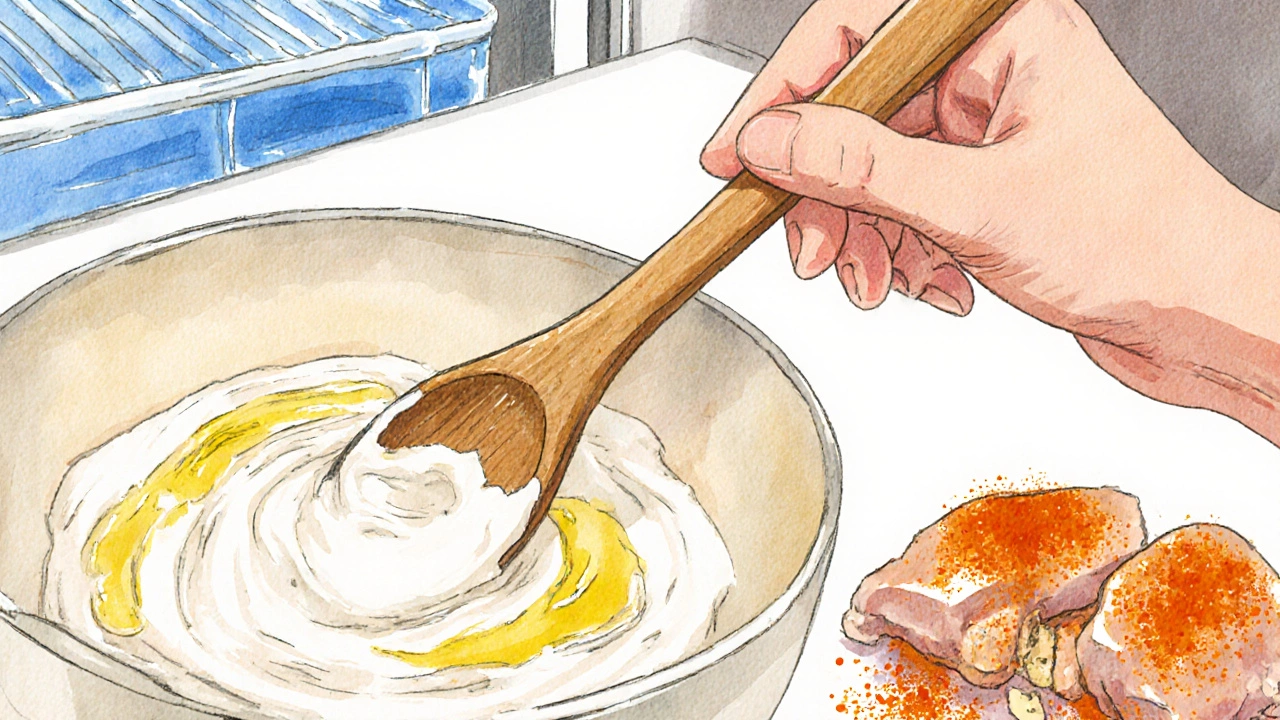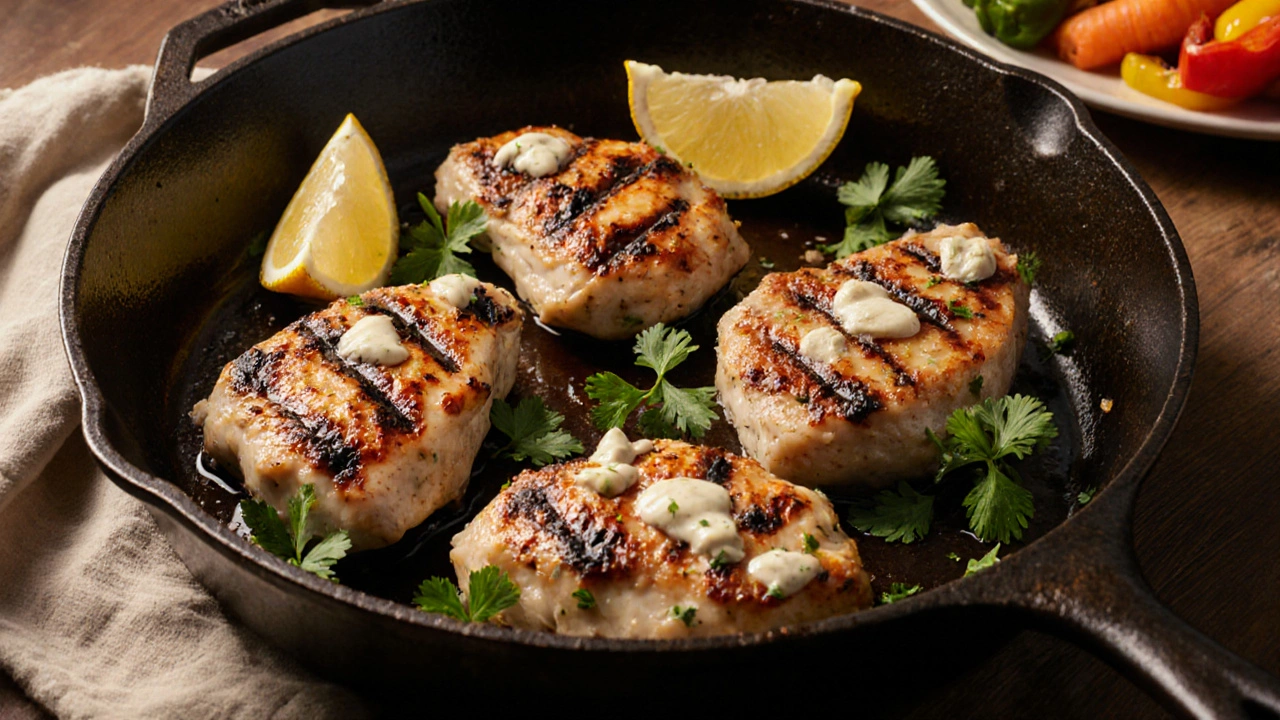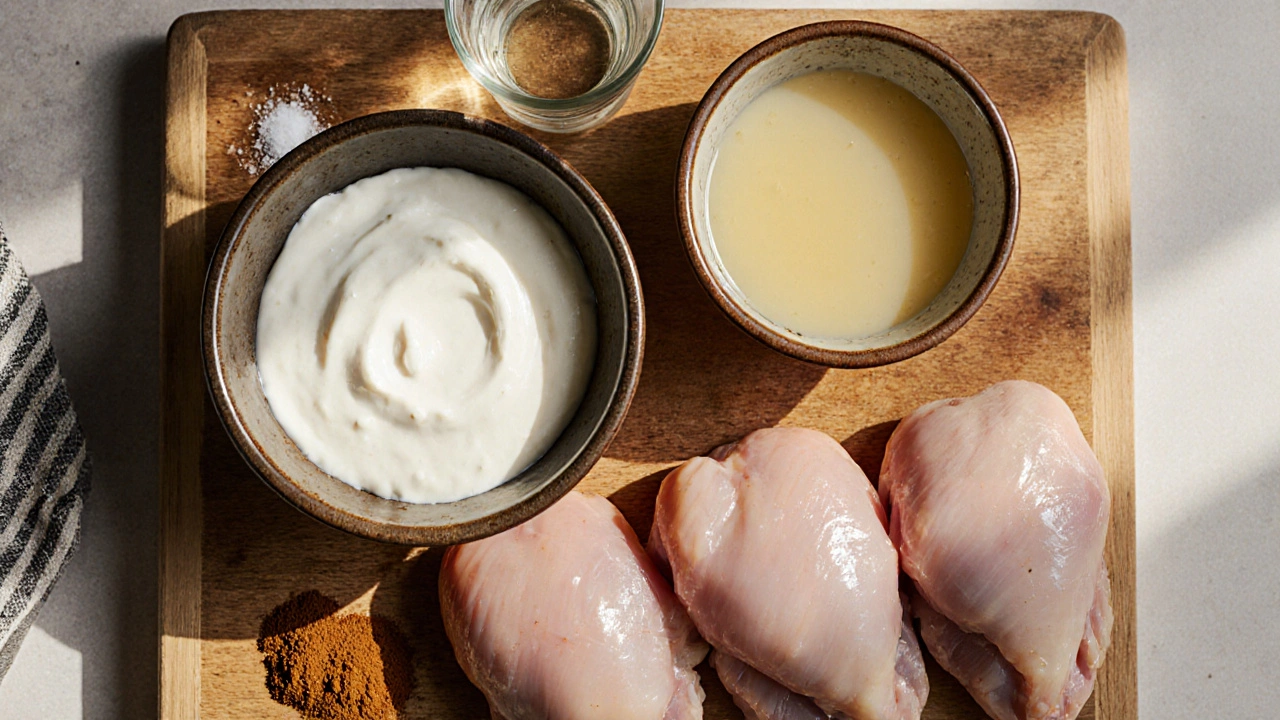Sour Cream & Yogurt Substitute Calculator
Yogurt Input
Results
Key Takeaways
- Sour cream can replace yogurt in a chicken marinade, but adjust the ratio and add a splash of acid.
- Higher fat in sour cream gives a richer, creamier texture, while yogurt offers more tang.
- Mix sour cream with a bit of lemon juice or vinegar to match yogurt’s brightness.
- Marinate for 2‑4hours - longer can make the chicken too soft.
- Always keep the chicken refrigerated and cook to an internal temperature of 165°F (74°C).
When you wonder whether you can swap Sour Cream is a thick, high‑fat dairy product with a mild tang for Yogurt (a cultured milk with a distinct sour note and usually lower fat in a chicken Marination (the process of soaking protein in a seasoned liquid before cooking), you’re really asking about three things: flavor, texture, and safety. Below we break down the science, give you a fool‑proof substitution method, and share a simple recipe you can try tonight.
What Makes Yogurt a Popular Marinade Base?
Yogurt’s magic comes from two key attributes:
- Acidity - The lactic acid in yogurt gently breaks down muscle fibers, keeping the meat tender.
- Moisture - Its watery component spreads flavors evenly throughout the chicken.
Beyond that, the probiotic cultures can add a subtle depth that many cooks love. In Indian and Middle‑Eastern kitchens, yogurt‑based marinades are a staple because they balance spice with a cooling creaminess.
How Sour Cream Differs
Unlike yogurt, sour cream typically contains 18‑20% milk fat, versus 3‑5% in low‑fat yogurt. This higher fat content changes two things:
- Flavor - The richness mellows sharp spices, giving a smoother mouthfeel.
- Texture - A thicker coating that can cling better to the chicken surface.
However, sour cream’s natural acidity is milder. If you use it straight, you’ll miss the bright tang that yogurt imparts. The trick is to boost that tang with a splash of lemon juice or a sprinkle of white vinegar.

Step‑by‑Step Substitution Guide
Follow these steps to replace yogurt with sour cream without compromising taste or tenderness:
- Measure the same volume of sour cream as the recipe calls for yogurt (e.g., 1cup).
- Add 1‑2tablespoons of lemon juice or white vinegar per cup of sour cream. Stir until the mixture is smooth.
- Season with the same spices, but consider reducing any extra salt by 10% because sour cream is naturally richer.
- Combine the chicken pieces with the adjusted mash. Make sure each piece is fully coated.
- Cover and refrigerate for 2‑4hours. Longer than 6hours can cause the meat to become mushy due to the dairy’s enzymes.
- Cook using your preferred method (grill, bake, pan‑sear). Aim for an internal temperature of 165°F (74°C).
That’s it - a simple tweak that lets you keep cooking even if you’re out of yogurt.
Flavor Profile: What to Expect
With sour cream, the chicken will taste richer and slightly less tangy. If you love the bright zip that lemon or lime provides in yogurt‑marinated dishes, the added citrus in step2 restores that punch. Think of the difference like swapping a light vinaigrette for a creamy Caesar dressing - the base changes, but the seasoning still shines.
Texture Differences and How to Manage Them
Because sour cream is thicker, it forms a more adhesive glaze on the chicken. This can be great for browning, especially on the grill. If you prefer a looser coating, thin the sour cream with a tablespoon of water or milk before mixing with the acid. That gives you a consistency closer to traditional yogurt while retaining the extra fat.
Safety Tips When Marinating with Dairy
Both yogurt and sour cream are perishable. Keep these rules in mind:
- Always marinate in a sealed container or a zip‑lock bag.
- Store at ≤40°F (4°C) - never leave out at room temperature for more than two hours.
- If you’re using a large batch, divide the mixture into smaller portions to ensure rapid cooling.
- Discard any leftover marinade that has touched raw chicken unless you boil it for at least three minutes.

Simple Sour Cream Chicken Marinade Recipe
Here’s a quick, tasty recipe that puts the substitution method to the test.
- Ingredients:
- 4skinless chicken thighs (about 600g)
- 1cup Sour Cream
- 1tablespoon fresh lemon juice
- 2cloves garlic, minced
- 1teaspoon ground cumin
- 1teaspoon smoked paprika
- ½teaspoon ground coriander
- ½teaspoon salt (reduce if using full‑fat sour cream)
- ¼teaspoon black pepper
- Mix the sour cream, lemon juice, garlic, and all spices in a bowl until smooth.
- Coat the chicken pieces, ensuring every surface is covered.
- Marinate in the refrigerator for 2‑4hours.
- Cook:
- Preheat a grill or skillet to medium‑high heat.
- Cook the thighs 6‑7minutes per side, or until the internal temperature reads 165°F (74°C).
- Serve with fresh herbs, a squeeze of lemon, and a side of roasted veg.
This dish highlights the creamy richness of sour cream while keeping the chicken juicy and lightly spiced. Feel free to swap the spices for tikka‑masala, oregano, or chili flakes, depending on your palate.
Common Pitfalls and How to Fix Them
- Too thick a coating - Thin the sour cream with a splash of milk or water before adding acid.
- Flavor too bland - Increase the acidity (extra lemon juice) or add a pinch of salt.
- Chicken turning mushy - Stick to the 2‑4hour window; longer marination with dairy can break down proteins excessively.
- Uneven browning - Pat the chicken dry after removing it from the fridge; excess moisture can steam rather than sear.
Frequently Asked Questions
Can I use low‑fat sour cream instead of full‑fat?
Yes, but the resulting marinade will be less rich. You might want to add a teaspoon of olive oil to compensate for the missing fat, and increase the acid slightly for balance.
Do I need to add extra spices when using sour cream?
Not necessarily. The higher fat content can round out sharp spices, so you may actually need a little less salt or chili to avoid overwhelming the palate.
Is raw chicken safe to sit in sour cream for a day?
No. Even though sour cream is acidic, it’s not enough to keep raw poultry safe beyond 4‑6hours. Always keep the marinating time short and refrigerated.
Can I freeze the marinated chicken?
Freezing is possible, but the texture may change once thawed. If you plan to freeze, limit the marination time to 30minutes before sealing and freezing. Thaw in the fridge and finish cooking immediately.
What’s the best cooking method for this marinated chicken?
Grilling or pan‑searing works best because the thick sour‑cream coating caramelizes nicely, giving a golden crust while keeping the interior moist.
Bottom Line
If you’re out of yogurt, sour cream chicken marinade is a reliable backup. Adjust the acidity, mind the marination time, and you’ll get a tender, flavorful result that’s richer than the classic version. Experiment with herbs and spice blends to make the dish truly your own, and enjoy the confidence of having a handy dairy swap ready in your pantry.
